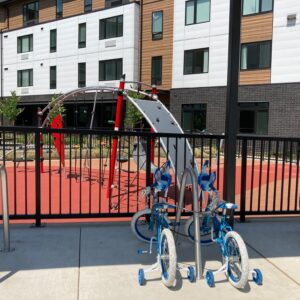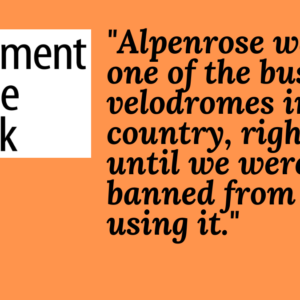
(Photos by mitchwilson.co)
There’s a new voice for businesses in Portland and they are focused on two issues that could make or break the future of cycling in our city. As we just reported with the City of Portland’s proposal to lower its bike mode share goals due what their analysis tells them is a lack homes in proximity to jobs, the issues of affordable housing and cycling are closely intertwined.
A business lobby group could help bend this trend in a different direction; but only if it wants a future with housing for everyone and more people on bikes.

The Portland Business Alliance has fallen out-of-touch with our city’s values and their influence is on the wane. Never before has this been more apparent than their recent gambit on the Better Naito project — an ill-advised letter-writing campaign that backfired royally. Instead of ginning up anger at the project as they intended, the campaign resulted in a flood of support to city hall. (A staffer with PBOT Commissioner Dan Saltzman’s office told us that, 48 hours after it launched, the PBA’s campaign resulted in 509 emails in support of Better Naito and just 110 against it. Oops.)
Which brings me to that new voice.
Business for a Better Portland held their first social mixer for members on Monday at the rooftop bar of Revolution Hall in southeast Portland. It was a packed house full of our city’s most talented entrepreneuers and business movers-and-shakers. They’ve come a long way since their launch in January 2016 when they were named PICOC, short for Portland Independent Chamber of Commerce.
Advertisement
As a paying member of the group (at the $200 per year “Builder” level, their lowest tier), I attended the event to meet other business owners and hear what they had to say.
“We we want to play offense. We want to see solutions. We want to see the ball moved down the field.”
— Mara Zepeda, Business for a Better Portland
The speaker list gave me a clue: Oregon State Rep Karin Power (D-Milwaukie), whose key issue is housing and tenant rights; Dan Saltzman, city commissioner of transportation; and Israel Bayer, former editor of Street Roots. (Oregon House Speaker Tina Kotek spoke before the main event to higher-paying members.)
Mara Zepeda, a whip-smart and accomplished yet likably humble serial entrepreneur and co-founder of Business for a Better Portland, was the emcee.
She told the large crowd that the group was formed by people with roots in the tech sector who saw a wave of change happening and didn’t feel represented by the existing “business community”. Zepeda explained that the driving principle for the group’s creation was that, “We didn’t want to create San Francisco again… We didn’t want to makes the mistakes San Francisco made, wanted to keep The Bay at bay.”
To stymie the wave of new money and the changes it brings, a group must wield political power. When she introduced State Rep. Karin Power, Zepeda said, “We we want to play offense. We want to see solutions. We want to see the ball moved down the field.”
Power shared how she and her family were priced out of southeast Portland due to rising rents — despite the fact that she and her partner have college degrees and work full-time.
Portland City Commissioner Dan Saltzman also mentioned housing issues — and how they intersect with transportation reform. “As we grow denser and grow up not out, things like parking minimums for new development become issues,” he said. “We also know that as this city grows it’s more important to make sure all of our streets are safe for not only motorists, but pedestrians and bicyclists as well. That’s why we have a Vision Zero plan to eliminate all traffic deaths and serious crashes by 2025.”
And Street Roots’ Israel Bayer issued the kind of activism-infused call-to-action that has been the hallmark of this young organization. “The future of this organization plays a very critical role at the crossroads of the future of our city,” he said. “We’re in a time of great political divide. Our city is divided over homelessness, our country is divided over politics, and it will take all of us to be able to rise above the noise to be able to move in the same direction to bring change to the people.”
Whether or not that change involves the kind of transportation reforms many of us want depends on who shows up and makes their voice heard.
— Jonathan Maus: (503) 706-8804, @jonathan_maus on Twitter and jonathan@bikeportland.org
Never miss a story. Sign-up for the daily BP Headlines email.
BikePortland needs your support.







Thanks for reading.
BikePortland has served this community with independent community journalism since 2005. We rely on subscriptions from readers like you to survive. Your financial support is vital in keeping this valuable resource alive and well.
Please subscribe today to strengthen and expand our work.
You say there was talk about “transportation reform”, but did anyone offer specifics?
well it was a social mixer so speakers weren’t keen to go into details… But the history of this group’s actions – lobbying for parking minimums and vision zero — speak to transportation reform.
Lobbying against parking minimums, you mean! 🙂
“To stymie the wave of new money and the changes it brings”
I am delighted to hear this part articulated, but what about the other half of the equation?
If we don’t problematize growth we’re just whistling in the wind. You can’t celebrate growth (in population, in consumption, in housing, in jobs, in building permits, in tax receipts, in…..) without coming up against hard limits. To ignore growth worship in our society is to just kick the can of reckoning further down the road.
regulating growth in our culture is a hard enough political and cultural lift as it is.
problematizing (great word!) it seems an even heavier lift.
But I hear you and I like the case you are making. I agree it’s important to be skeptical of these types of norms (like growth is always good).
In my experience, most anything worth doing is hard.
I’ve posted these folks here before, but they took a serious crack at the subject:
http://agoregon.org/page28.htm
http://agoregon.org/page102.htm
http://agoregon.org/page57.htm
I propose that simply not growing a city would be markedly easier than unregulated growth and downright effortless compared to regulated growth.
I am aware, however, that even considering the idea that city population growth may not be compulsory is seemingly impossible for a large percentage of people, and probably more so within a group likely to consider every new resident a future customer.
Are you proposing that we hand out free birth control, or are you the “I got here first; stay away” type?
Sincerely,
A Native Portlander
Cheap shots are certainly easy to take but not all that helpful in my experience.
If you want to have a serious conversation about this, let’s have it; but I’m not interested in cheap laughs.
There are tough conversations to be had, no question. But if we conclude that we prefer not to have those tough questions, what has been gained, and more importantly who? Make no mistake what we have now involves real consequences to real people. The reckoning, when it does come, will be that much worse, because now we have four million people in Oregon whereas when I was born there were only two million. Real people are harmed today in our city by the conditions that prevail. Ignoring the tough questions, the tradeoffs, the uncomfortable subjects does not put roofs over their heads or pay their rent. Like everything else worth talking about this is a dynamic situation. Exponential growth, unchecked, or worse actively pursued, leads to ruin.
Portland is half as dense as Berkeley, California which is really a suburb. We wouldn’t want to double the population overnight, but I think there is room for a few more. And from a sustainability perspective, one of the best things Portland could do is welcome more people from carbon intensive states (Oregon’s CO2 emissions per capita is less than half of Texas’s).
Yes, sure.
But what you propose only makes sense if we actually have a cap, a commitment to no growth overall, because in the absence of such an understanding, exponential growth will overwhelm any small-bore re-shuffling like what you are proposing.
Local solutions are by their nature small bore and always insufficient by themselves to meet global goals. But they are useful nonetheless.
I am all for local solutions; it is what I do. But I think you misunderstood my critique. You said, and I quote: there is room for a few more. You said nothing about a cap, or about the impossibility of adopting your stance as a general rule. We have in fact taken your advice the world over, and now we’re at 7Billion? or is it almost 8? When is it enough? When do we realize that by diddling we’ve made the problem that much worse?
Oregonians’ CO2 footprint may be less than Texans’, but do Texans change their habits and adopt a low CO2 lifestyle when they arrive here? Sure, there’s less need for A/C (or, in my opinion, none, even on these hot days), but there are a lot of other factors that contribute to a footprint, many of them based on energy use, recreation, and consumption habits.
I don’t think you can automatically conclude that Texans moving here is beneficial overall.
I think that you have to strike the right balance between purity and inclusiveness. Like Boulder, Colorado is very opposed to new growth that would impact the character of their community but the upshot is just that the surrounding (sprawling) suburbs are going gangbusters and gobbling up all the demand. Where Portland should fall on that spectrum between trying to bring more people into the fold and trying to preserve existing character is of course a source of hot debate. I suppose it is good to see people grappling with the issue no matter where they come down.
“Where Portland should fall on that spectrum between trying to bring more people into the fold and trying to preserve existing character is of course a source of hot debate.”
I respectfully differ on what the relevant spectrum is. Trying to bring more people here (which is almost everywhere the default) is problematic from the perspective of carrying capacity so right there it isn’t or shouldn’t be on the spectrum of reasonable goals. And preserving existing character—which I happen to personally think is important—is however not really on the same scale as what I thought we were talking about: how much is too much? It is an aesthetic and sociological question that deserves its own efforts. Endpoints on the spectrum that make sense to me would be Limiting growth through a public conversation, with compassion and sincerity and a mindful wariness about past xenophobic and racist policies, vs. limiting growth in a manner that rides roughshod over these matters.
“I suppose it is good to see people grappling with the issue no matter where they come down.”
We agree. And thank you for weighing in on this.
We really do need to break the cycle. We continue to create these cities that become so ridiculously dysfunctional that so many flee, only to then turn that city into a mirror image of what didn’t work.
I get it, that to be effective a group like this needs money and power. But it slightly disturbs me that this early on they are dividing the higher payers from lower payers in terms of who has access, ( Tina Kotek Speech). If they are not careful, going down the road of ,more money equals more “speech” and more access we could recreate the PBA all over again. I applaud the alternative to the hidebound PBA and hope they can create and keep a populist and progressive agenda in the face of money needs.
“the City of Portland’s proposal to lower its bike mode share goals due to a lack [of] homes in proximity to jobs”
repeating the city’s spin does not necessarily make it true. also, there is a typo.
I am very disappointed that I cannot afford to buy a 3 bedroom house in Beverly Hills, CA where I want to live! I have a college degree and work full time. I should be able to buy a house anywhere I feel like it.
I my opinion we should let the market work things out. Every time that things like rent control or other well meaning laws are passed the problem does not improve. NY and San Francisco have had rent control for decades and it has not help make things affordable. It is basic supply and demand. When people really want to live somewhere and there is finite amounts of land the cost to live there goes up. It is a much better problem than what happened in Detroit or Cleveland where everyone left.
I think there are two (very different) things going on in your post.
(a) I want to live in (by which I think you mean move to) Beverly Hills, but it is too expensive; and
(b) as speculation and in-migration and fecundity and gentrification drive prices in my city through the roof, those who already live here are (or may be) priced out.
No one here seems to agree with me on this, but although I’m not much concerned about (a), (b) chaps my hide. They are obviously related, but by failing to distinguish the two we miss all kinds of opportunities for conversation and learning…it is easy to make cheap shots, not so easy to acknowledge the humanity of those who are forced to leave.
I understand the good intentions that can lead someone to make those distinctions. The idea that residents deserve some sense of housing and economic stability for instance. It’s a compelling and sympathetic narrative.
When I consider the nation as a whole, however, I see a larger picture. Is a person born and raised in Beverly Hills more entitled to an apartment in Beverly Hills than a person born and raised in Baton Rouge?
The idea that local governments should serve residents is relatively easy to agree on. When that local government starts passing protectionist legislation within a nation that has no internal migration restrictions I see a conflict.
I agree, but there are other ways too approach the problem. Limiting the growth of new jobs (by, for example, limiting the growth of office space or industrial space), could limit population in a non-protectionist sort of way. I don’t necessarily advocate for this approach, but it is an example of a solution that might not face the problem you described.
“Is a person born and raised in Beverly Hills more entitled to an apartment in Beverly Hills than a person born and raised in Baton Rouge?”
Well let’s say we agree that that person is NOT, where does this lead?
As much as saying they ARE is fraught, I think the alternative is considerably worse. A free-for-all serves no one, least of all those who are already at the bottom, and it takes agency away from the locals who in theory could pass enlightened laws that attempt to regulate aspects of this, such as what Hello, Kitty proposed above.
This is not entirely true, there are many places in NYC where families have lived in the same apartment for decades and rent control has prevented them from being forced out by greedy landlords with 35% rent increases.
But then, most of those people couldn’t afford to leave if they wanted to, because absolutely nothing even remotely comparable is in their price range. They have a good deal as long as they stay put. But if they ever want another bedroom, they’re out of luck unless they want to move completely out of the area.
Rent control can be helpful to protect renters in the short-term, but in the long term it just contributes to the housing shortage.
Ultimately, there are only two effective ways to make housing affordable: (1) build plenty of new housing where people want it; or (2) reduce the quality of life in the area to the point that people start leaving. Personally, I’m partial to the first option. We need a lot of new housing that will let people rent or buy reasonably close to where they work. Every level of government should be trying to make that happen.
“Ultimately, there are only two effective ways to make housing affordable”
Those aren’t even close to the only options.
Like nearly everyone else, you are forgetting that population growth is the chief driver of this problem. If the population is stable, and household size isn’t shrinking (neither of which obtain here) then there’s no a priori reason for the costs to rise, because everyone already has a house…
population growth is certainly a driver, but I don’t know that it’s the chief one. if our culture (tax code, banking and real estate industry practices, zoning, television, &c) incentivized a different sort of development pattern, a lot more folks could be housed inexpensively.
addressing population growth is a long game. population would keep going up for decades even if the average number of children per reproducing human was dramatically reduced. doesn’t mean it doesn’t need to happen, but it’s not a quick solution.
of course, cultural change isn’t likely to be a quick fix, either, but incremental changes in the right direction can have benefits more quickly than changing birthrates would.
New housing is rarely affordable. Building more will serve the upper end of the market (which isn’t really in crisis), but people who require housing at the low end will remain severely squeezed.
If you want more affordable housing, you need more public housing.
Building more housing does not automatically result in more affordable housing.
Lots of housing has been built in the Pearl and on Division and Williams, for example: very little of it is affordable. Much less housing is being built on far East Portland (east of 82nd): but housing there is more affordable.
There are three main factors in the price of a housing unit: cost per unit, market price per unit, and price control and subsidies.
Cost per unit: this sets a floor for housing price. If land values plus construction, regulatory, and financing costs are such that it costs $300,000 to build each unit, then that sets the floor for the unit’s price. Developers build housing to make money, not to lose money.
[Ways to reduce cost per unit include: select locations with lower land values, high density of units per acre of land (reducing unit size and increasing number of building floors), construction with cheaper materials and less labor cost (but driving the pace of construction even higher than it already is will further drive up labor costs).]
Market price per unit: this sets the actual housing price, absent price controls. If units are selling for $500,000 in the area, then that will be the price of the unit will be $500,000. Developers will charge as much as the market can bear, they are profit-maximizers (with very few exceptions).
[Ways to reduce market price per unit: select locations with lower market prices, make units less desirable (smaller units e.g. micro-apartments, fewer amenities). Increasing building age also usually reduces market price, in the apartment market, but this usually takes many decades to play out.]
Price controls: external controls like rent control and inclusionary zoning can reduce the unit’s price below market price. External subsidies can also reduce the unit’s price. However, excessive controls can reduce building activity and cause units to be removed from the rental market, and subsidies are limited by funding.
Another factor to consider is that when new housing is built by demolishing older housing, the new housing is often more expensive than the old. For example, Portland is considering regulations to force owners of older brick apartment buildings to install seismic upgrades; in most cases, those upgrades will be so expensive that the buildings will be demolished instead; if the location is “desirable”, the new apartment units built on those sites are likely to be more expensive than the old units were.
[For example, over 3,000 older Portland houses have been demolished in recent years, most of them were affordable, almost all of the replacement houses are high-priced. That is nearly 2X as many affordable units demolished, than will be built with the recent $250 million affordable housing bond. I do not have numbers for the number of older apartment buildings demolished.]
In general, I think that trying to substantially reduce housing price in central and close-in Portland by increasing development activity and density isn’t going to succeed. Land values will only go up, and you’ll see more high-priced units built. The market price of those high-priced units may grow more slowly or may even come down a little, but they will still be high-priced units. And the older lower-priced units will disappear through demolition and re-development.
I think Portland will be better off focusing development on the areas of Portland farther from the center (e.g. east of 82nd) where land values and market prices are lower and thus new housing units will be more affordable. The thing is, the city will have to make transportation options (bus, MAX, bike) much better and develop job centers in those areas. So things like BRT and bike lanes are fundamentally intertwined with affordable housing, as BP has pointed out.
Excellent analysis, thank you!
I agree, although if you had chosen to replace every instance of affordable with an accurate word, I wouldn’t have developed a migraine trying to stifle my “definition of affordable” rant.